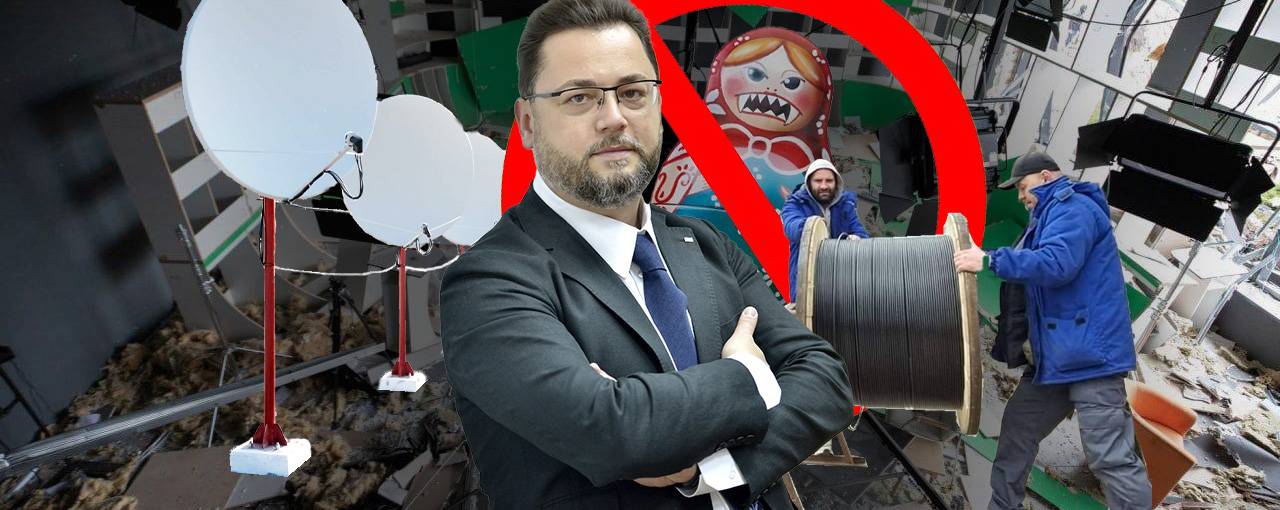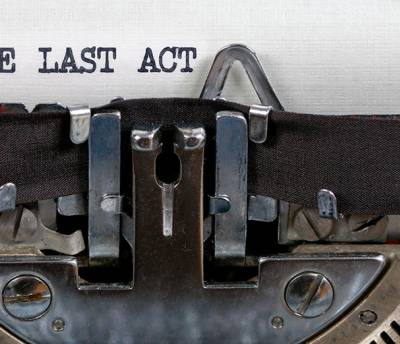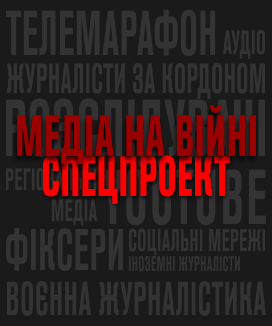
On February 24, when a full-scale war broke out and many people, including our editorial staff, were in a state of shock and confusion, the National Council of Television and Radio Broadcasting was holding a scheduled meeting. Although the items addressed there were far from planned, that day the regulatory authority remained an island of stability for its licensees. In fact, it remains it to this day, helping media to maintain the information front from assisting in coverage expansion of domestic and foreign broadcasters to organizing assistance with equipment and humanitarian aid. To summarize the results of this work and analyze the current state of the industry, we spoke with Maksym Onopriienko, member of the National Council.
– On the first day of a full-scale war, the National Council held a regular meeting, resolving urgent market issues. What was the day like when you went to that meeting, what were your colleagues and you planning to do, against all odds?
– That was a strange feeling… On the day of the meeting I always go to the gym, then to the internal meeting and finally to the meeting, so the day usually starts early. But that day it started even earlier with a phone call. It was my wife: "Are you still asleep? They are bombing us."
For some reason, on a subconscious level, I had the only decision that day – get ready quickly and go to the National Council. I was driving to the wailing of sirens and the sound of explosions while chatting with my colleagues. We decided to hold a meeting no matter what, we figured out who could join to make quorum, and we formulated texts of resolutions on the possibility of deviating from the program concept and stopping broadcast in pretty much chatting mode, because we realized that we need to help broadcasters be more flexible if the country entered a state of war. Then some of my colleagues and I went to work in the National Council. The tension in the air was palpable. We kept wondering whether the bombs will or will not start falling down. We were there almost all day long. Our management board, against all odds, met requirements – decision must be signed, everything must be minuted – and then we drove them home.
– The National Council has written numerous appeals to regulatory authorities in other countries with a request to stop broadcasting Russian propaganda TV channels. Almost 30 countries reacted to them in the first few weeks, but did their number increase with time?
– We immediately set for ourselves two priorities of work under martial law. The first one dealt with close communication with domestic licensees: who, where, how, did the broadcast stop, did people leave, was the broadcast restored after the towers were hit, are there any reserves, and so on or and so forth. The second direction was connected with active European inclusion. The President, the Office, the Cabinet of Ministers were working in their own areas (weapons, finance), while we were working in terms of information resistance. I believe on the second or third day our task force – those colleagues who did not flee with their families and those who had connection – created a command staff and began to write letters on two subjects: banning Russian channels and launching the Ukrainian ones.
– How many letters did you send?
– More than 60. There is the EPRA, a platform that brings together European regulatory authorities, and the first letter was sent to this body. Then they wrote directly to each regulatory authority or their executive officers. Those who responded acted immediately, but the number of countries remained virtually unchanged over time.
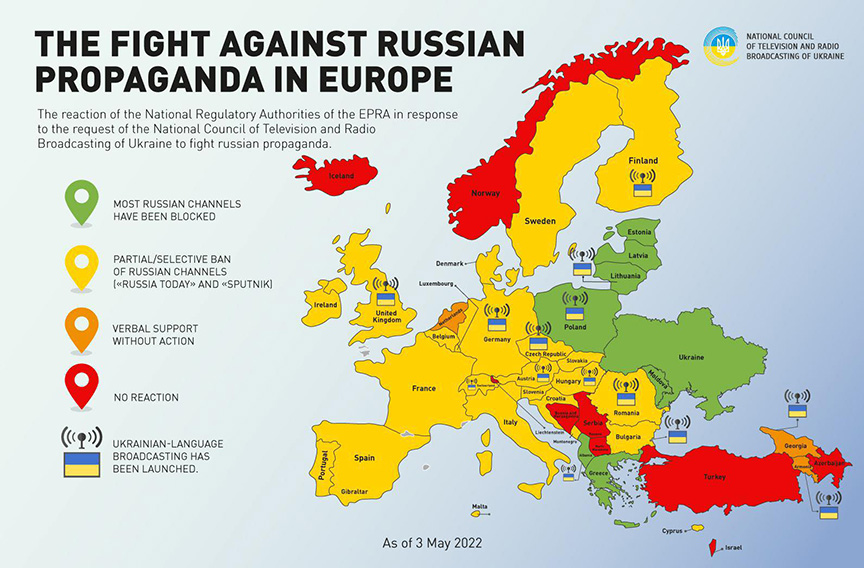
– Those who did not respond, did they explain their position, and how exactly did they do that?
– You do understand that it is hard to stay silent or refuse at all, so the responses about the inability to act actively were mostly very diplomatic. Indeed, everyone started with words of support saying: Our thoughts are now with Ukraine, we understand the importance, but... Then they included various reasons: some referred to the legislation, others said that this is beyond their competence, because the broadcasting of foreign TV channels in those countries is regulated by the government.
– But you also appealed to the governments, since regulatory authorities do not affect the satellite broadcasting.
– Yes, a regulatory authority is just one component. The second component was addressing to Ms. Ursula (president of the European Commission Ursula von der Leyen. – MBR) and to Mr. Borrel (EU High Representative for Foreign Affairs and Security Policy Josep Borrel. – MBR) regarding satellite broadcasting, and we specifically spoke to our French colleagues, because most [Russian TV channels] broadcast from French satellites. Last week we had another round of communication, and the subsequent meeting is planned this week because the satellite broadcasting is owned commercial companies. This is no longer a decision of the regulatory authority, and apparently the government also cannot manually turn the switch. Concurrently, we submitted a detailed description of all legal entities to our Ministry of Foreign Affairs, National Security and Defense Council, and the Office of the President so that they could include the media block in one of the following sanction packages.
The widespread shutdown of RT and Sputnik was a decision at the EU level, but there are almost twenty other propaganda TV channels: Channel One, Russia 24, NTV, TV Centre and others. Ukrainians who have fled abroad constantly write to us: "These channels are broadcasting, do something, why do you stay silent". Yet we are not silent, but such things cannot be done at the push of a button. All the efforts are currently focused on this issue.
– Alongside blocking Russian propaganda, you contributed to the launch of Ukrainian TV channels on European satellites. In particular, at the request of the National Council, the regulatory authorities simplified the procedure for Ukrainian channels. Could you tell us in more detail what exactly changed?
– This is also a new experience for regulatory authorities, and some of them, like in Poland and the Baltic countries, went full scale, while others tried to make the most of the Ukraine case because it is a political issue for some European countries. Due to their mentality and the need to have a balanced position, Europeans don’t tend to do everything quickly, so some regulatory authorities decided that a Ukrainian license would suffice to be included in the providers' packages. Accordingly, the channel contacts the regulatory authority of that country, which then requests us for license confirmation and authorizes broadcasting. In some countries, regulatory authorities require channels to have any European license, for example, a Latvian one. Just a few days ago, we were approached by the Irish regulatory authority with a request regarding the confirmation of the Ukrainian license and the availability of a European one for 1+1 and Ukraine 24 channels. I can understand them: we simplify procedures through martial law, and they live according to their own legislation and require grounds for certain decisions. We also have regulations for adapted channels, and when some TV channel would approach us, it had to go through a procedure and meet a number of criteria in order to broadcast on the territory of Ukraine.
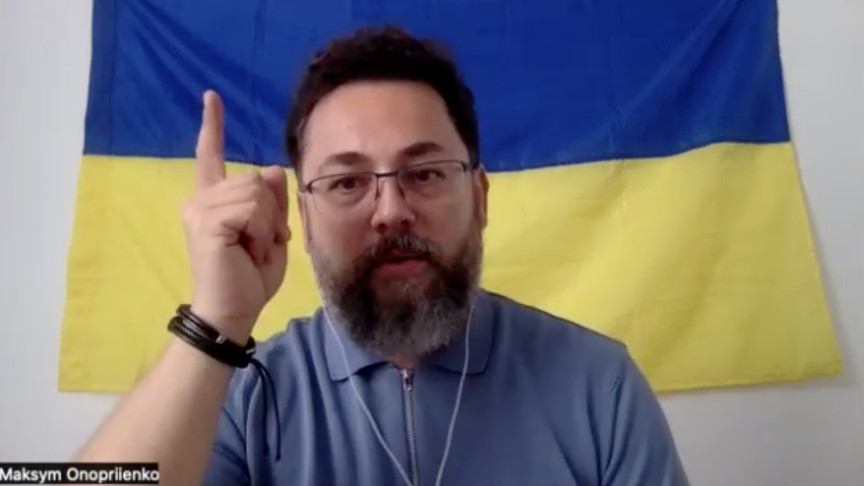
Nevertheless, this process mainly favors TV channels. For the most part, these are business activities, since the contracts are signed not with the regulatory authority but with providers. As far as we know, each Media Group is very active in this direction. For example, recently Starlight Media reported on 42 countries where the ICTV Ukraine channel was launched.
– So you mean that this is rather assistance on the part of the regulatory authority.
– We might have made the first step because Ukrainian TV channels were also confused in the first days, and all resources were thrown, in particular, to create a single information marathon. The National Council, having written letters to European regulatory authorities, has opened this door – block the Russian channels and launch the Ukrainian ones. By the way, those regulatory authorities that actively responded and supported us simply provided Ukrainian TV channels with necessary contacts. After the first week, when everyone got the hang of it, took care of the employees’ safety, created backup studios and began to think not only about the current broadcast, but also strategically, we directed licensees where to apply for broadcasting in Europe.
– What is happening to Russian entertainment TV channels that worked in Ukraine, licensed by a European country and disguised as international? Will they stay or will the market drop them?
– Which channels are you referring to?
– For example, movie channels that don't broadcast news. Now the country is abandoning everything that is somehow connected with Russia.
– We monitor everything, and the channels work if there is no Russian programming, Russian advertising, no mentions of Roskomnadzor licenses, news on the air. There is such an abundance of Telegram channels and information flow that people need to switch. That's why we look at the content: when it poses any danger we react immediately, of course. For example, for some reason the Indian Zee TV channel advertised previews in Moscow time. We requested the providers to shut it down. Or the Chinese CGTN: we understand that China has never made unequivocal statements about the war, and there were questions regarding their news. So we asked the providers to exclude the channel from the packages.
– A month ago, you asked regional media professionals to provide the collected facts of war crimes of rashists. How is this information collected and is the National Council involved in the process?
– It is such a wide range… Firstly, it was an appeal from the Prosecutor General's Office, so we, accordingly, turned to regional broadcasters. In order not to complicate logistics, a single cloud storage was created, which was mentioned in all reports, no matter which body communicated this appeal. Secondly, the monitoring center of the National Council records the broadcasts of all Ukrainian broadcasters (whether it is the United News marathon or own broadcast), and once a week our analytical group singles out war-related issues, in particular war crimes. That's how we help the Prosecutor General's Office. Thirdly, we record Russian TV channels collecting materials for the Prosecutor General's Office, which communicates with The Hague judges and other courts.
– What is the Russian broadcast analyzed for?
– We record the facts of propaganda of the war in Ukraine, spreading fakes, incitement to hatred, threats against other countries. After all, even though their programming is full of propaganda about Ukraine they also threaten Europe and the whole world. We record all this, analyze and draw the attention of our colleagues from other regulatory authorities, who either failed to respond to calls [to shut down Russian channels] or responded poorly. They might not have the opportunity to translate from Russian and they don't understand what's going on there (chuckles). By the way, all European regulatory authorities – ERPA members– will gather in Antwerp in May, where Olha Herasymiuk, the chairman of the National Council, will be also present. In particular, we are preparing all this information to present it and convince even those who are still hesitating.
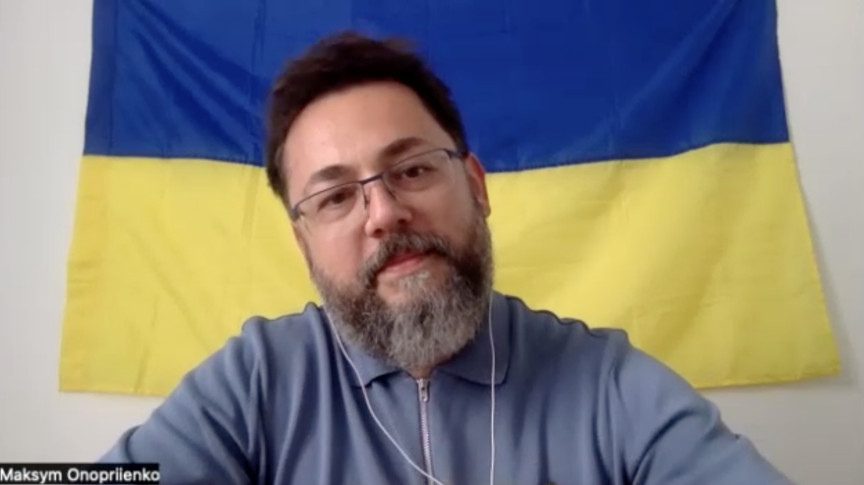
– One of the first decisions of the National Council was maximum simplification of all procedures. Could you tell us what the administration work looks like now, which has always been overwhelmed with documents and had to follow many bureaucratic procedures?
– I really want the useful things that we introduced during martial law to be preserved in peacetime. The National Council has indeed simplified many procedures, including digital broadcasting: regional TV channels were able to take slots in Zeonbud multiplexes on T2 without tendering. However, there have been some speculations regarding this topic in recent days, so I shall explain. Firstly, it did not apply to national channels, and secondly, we gave local channels the opportunity to broadcast in local multiplexes. For example, Lviv TV channel will broadcast in Lviv multiplex, Khmelnitskyi TV channel – in Khmelnitsky multiplex. This was introduced exclusively during the wartime and was recorded in the permits, although it was done mostly by e-mail, and in the early days simply by text messages and calls. Subsequently, we transferred all permits to the electronic document management system, which means that everything is collected, structured, recorded, and when the war is over, we will return to our original positions. By and large, no process fell between the cracks and all departments did their work. Both the website and corporate mail experienced cyber attacks, but the electronic document management system and all processes were quickly restored.
How does the system work now? As usual, I can say. We had a meeting on Thursday. All documents are prepared, all draft decisions, everything is minuted and recorded. My colleagues and I, we talk a lot about what the industry will be like after the war is over.
– How do you feel about the decision of the National Security and Defense Council, which obliged all national TV channels to broadcast the United News marathon?
– I think this is a right decision, because we are at war, and the information that goes on the air must be controlled. Furthermore, I saw the results of the Suspilne channel survey, which was conducted, in particular, on the information component, and there are views that the confidence in the marathon is quite high, in the ballpark of 80%, if I'm not mistaken. This once again confirms that everything was done right.
– Can you explain the situation with Espresso TV, Priamyi Channel and Channel 5 shut off from T2? Don't you think this is a false practice?
– The fact is that neither I nor the National Council can comment on this, because no decisions on shutdown were made. I know those channels write letters trying to find out where it came from and how the shutdown occurred, but it is such a tangled web... They continue satellite broadcast, we monitor them as before, and there can only be a subjective opinion about the shutdown.
– No one can explain. I thought, at least the National Council has the answer.
– We monitored them (like all other channels) for the proportion of the marathon broadcast and our own broadcast, but this is exclusively monitoring, with no penalties.
– On February 24, all TV channels stopped their commercial activities, and as of today, even large media groups have run out of reserves, so they return ads despite the lack of a telemetry data. How do regional companies survive? Perhaps you know the examples of regional broadcasters beginning to restore the commercial component?
– When everyone switched to a single marathon, we asked regional broadcasters to make local news if they could, because people in the Lviv region are interested in what is happening in the Lviv region: counseling, humanitarian centers, safety, etc. For some broadcasters who are unable to create their own content, the opportunity to broadcast the marathon still remains a lifeline. Nevertheless, almost in every region, channels are gradually returning to their own broadcasting. We are not talking about entertainment projects. News releases, briefings of the president and officials must remain, but the volume of local information – presence of local authorities, heads of military administrations on the air – is increasing. Unfortunately, the situation is not very positive, and many companies have stopped broadcasting (hopefully temporarily). We appealed to the Cabinet of Ministers to find a way for the state to cover the costs of at least signal transmission not only for regional but for all broadcasters. These are the services of the RRT Group, a state-owned enterprise. Moreover, Zeonbud came under the control of the RRT Group. The state surely cannot cover all expenses in this situations, there are still salaries, equipment rental, and other payments. But as for signal delivery, in our opinion, it is worth doing.
– What amounts are we talking about?
– Tens of millions, more than UAH 40 million per month, if we talk specifically about the Group. I'll tell you more. There will be more [broadcasting] breakdowns and halts, because almost every day we receive questions if there will be support. When communicating with all European partners, we also talk about the need for assistance. Unfortunately, the National Council cannot legally manage funds, even create a certain fund. So we do what we can – we talk as much as possible. We launched a project Media Heart of Ukraine where we tell the stories of media professionals, informing about the need for help. If someone can help with a cable, they will, others can help with hardware, with money, but directly to the broadcasters.
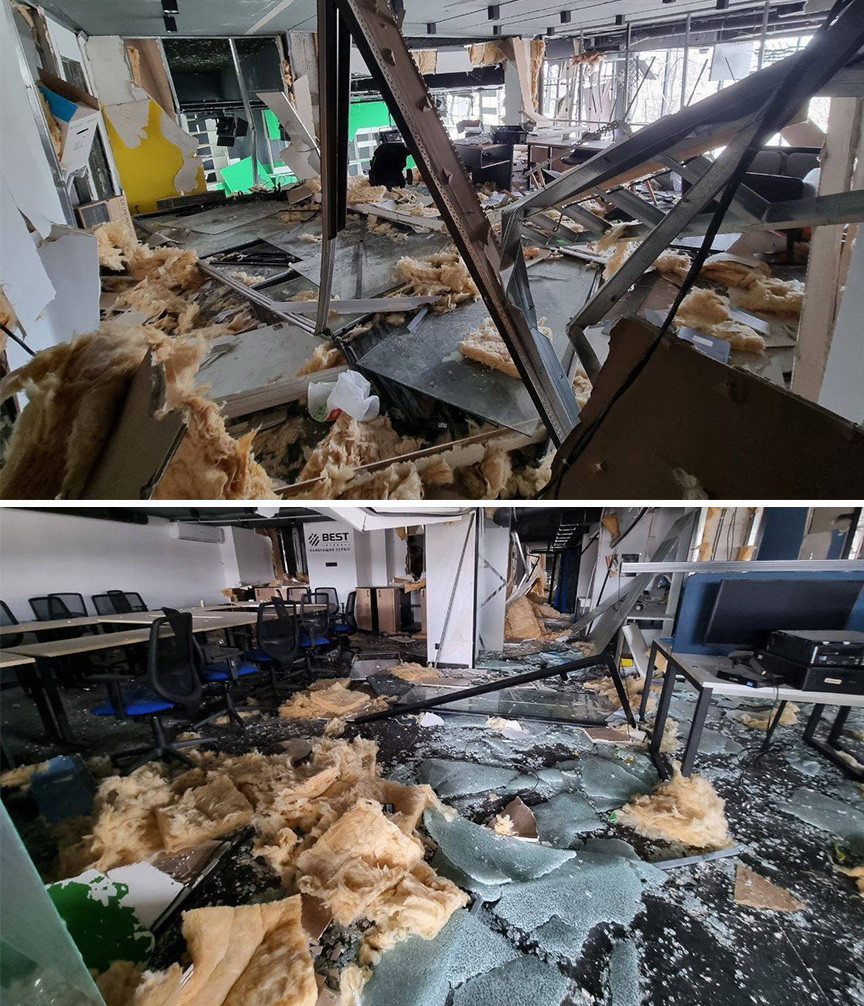
The occupiers destroyed the studio of the Pohliad TV channel and the office of the Best Internet provider located in Bucha: they sprayed the premises with bullets, broke the equipment and even smashed toilets and the kitchen with sledgehammers
We are now signing a memorandum with UNESCO, which, in particular, deals with material assistance: they undertake to form sets of equipment that are minimally necessary for television and radio broadcasting and send it to the regions.
– For broadcasters physically affected by the war?
– First of all for them, yes. But also for any broadcasters going back to work. For example, they are ready to work in Trostianets. Thankfully, the studio survived, but the transmission cable was completely cut off. It seems like small things, but in fact they are really valuable.
– There were plans to create a fund to support Ukrainian broadcasters, in particular regional ones, weren't there?
– There were. Let's say we are trying to do this at the personal contact level. Again, the National Council as a body cannot afford this, so we help specific broadcasters at the level of personal contacts in specific cases.
– How did the idea of the Media Heart of Ukraine project come about and who is involved?
- This is an initiative of the head of the media relations department, Andrii Bohdanovych, who joined us at the end of last year. They write these texts, communicate with broadcasters, and collect materials from those who kept them. For example, when the Sumy broadcasters fled, they deleted everything, same story in Mariupol. When publishing these stories, we can't just write bluntly: if you want to help, here is the account number. Therefore, at the end of each piece, we simply encourage you to support and contact broadcasters directly.
– Did the big media pick up these stories, as Olha Herasymiuk hoped they would? Or do they still remain on the website of the National Council among the pile of news?
– I saw that they started writing about Trostianets and Mariupol. In our social networks, the coverage of these materials reaches tens of thousands hits. Now comes the second stage. We waited for a certain amount of materials to be accumulated so that the English version could be actively sent to our friends, partners, regulatory authorities, and European TV channels, because they asked about help. So we will provide them with specific examples where they can help.
One more thing. We want to hold an online concert (maybe a physical one, if one of the TV channels supports us) in support of the affected regional broadcasters. We are doing this together with Pavlo Shylko, general producer of the YUNA award. Do you remember Kuzma Scryabin's song "Places of Happy People"? We had an adapted text written, about Mariupol, Irpin, Bucha, Kherson, Mykolaiv. The Scryabin band officially transferred the rights to adapt this song, and they also perform the main musical part, while the verses are sung by various Ukrainian artists. Kuzma also sings a few lines.
The Kuzma Scryabin Charitable Foundation also joined the initiative. Their accounts will be opened during the concert, and then the Foundation will distribute the funds raised among regional media outlets. We haven't talked about it in the media yet, but the work is at the finish line. Now we'll have talks with TV channels, whether someone would like to broadcast it. The Media Heart Project, Andriy Kuzmenko Foundation, Pasha Shylko, YUNA – this is how the collaboration looks like.
– The role of regional broadcasting in Ukraine increased in wartime, but were regional TV channels ready for such a challenge as covering the war? Do they meet the required standards? Were they trained accordingly? Is it somehow monitored in general?
– I'll start from the end. Everything is monitored. Regional TV channels as well. We have representatives in the regions, so monitoring has not stopped. Regarding coverage: in the second half of January, we conducted online trainings for regional broadcasters, in which we analyzed everything from preparations to war coverage, standards, balance, how to name an enemy, even which terms to use, internally displaced people or refugees. Therefore, I can say that they were prepared. With the outbreak of full-scale war, we constantly share recommendations and communicate through our representatives, if the Ministry of Defense would like to draw attention to certain things, for example.
– You periodically share wonderful stories about media companies from different cities of Ukraine helping each other. Are these isolated cases, or are there many of them now?
– There are many stories, and the first one is probably connected with media broadcasters from Chernihiv. They had a catastrophic situation there in the first weeks of the war, but with the remnants of power and electricity, they managed to pass on to other media outlets from the regions and national channels what they filmed during the day so that the country would know what was happening. Now, for many people, certain household items and the opportunity to pursue their professional activities come to the fore, so such stories as in Sloviansk are important. The broadcaster was able to evacuate to Chernivtsi where local broadcasters received them, provided premises, equipment, so the company continues to broadcast. Even Donetsk and Luhansk regions have Ukrainian broadcasting. Similarly with the Donetsk region, some broadcasters from Mariupol, from Zaporizhzhia are in Khmelnitskyi now. No one raises questions about rent or payments, everyone accepts each other, shares what they can. Volyn helps Chernihiv media a lot, accumulating and providing what they need, from sleeping bags to technical equipment.
Having learned from the experience of 2014, the Sloviansk radio station "Radio-M" promptly evacuated their staff, moved the necessary equipment to a safe place and now it broadcasts from different cities of Ukraine
In the first week, the National Council was a logistical and volunteer hub, if you will, because each region has its representative, secretariat, it is a real network, and employees of our licensees, broadcasters, their friends, relatives had the opportunity to contact us during the evacuation, when the road could take several days. Say, someone was caught in the curfew in Cherkasy. Where to go? They call a representative of the National Council or me personally, and then I call a representative.
– And what is happening within the framework of the National Council project Media Change Ukraine which was launched as an anti-crisis solution during lockdown and has reoriented itself today from sharing content to helping people?
– In fact, a lot of content passed through Media Change Ukraine during this period, we just simplified the procedure as much as possible. If someone shared content, it was sent directly to other broadcasters, either through representatives or simply on the mailing list. Consequently, the platform refocused on help, volunteering, so for the first two weeks I was involved in everything related to logistics, transportation, accommodation, helping our employees, licensees, their friends and relatives. As a matter of fact, I realized right away that having representatives in each region is our advantage and strength. Each of them is known locally, in their own region, and they, accordingly, could direct the help in the right way.
– But these are not all volunteer initiatives that the National Council is involved in, is that right?
– The volunteer movement in Ukraine is very large and powerful. Everyone can see how much humanitarian aid is coming to the country. Therefore, we deal with subject situations: if there is a request for assistance to specific institutions, specific people with specific list of needs.
– And these establishments are not connected with the media?
– No. If we take the media out of equation, the country's top priorities are the army and healthcare. But there are institutions that also need help, and during martial law they faded into the background. For example, a neuropsychiatric dispensary in the Obukhiv district near Kyiv. They're in real trouble there. And just now a truck from the Baltics is coming, carrying non-medical aid (bedding, mattresses, food). Next week we are expecting medical aid. This is also done by our representatives: Lviv receives and unloads the cargo, then it is transported to Kyiv. We also use our own media capabilities to draw attention to such issues. Recently, a post about doctors from Berdiansk who remained at their workplaces gained a wide coverage. They simply have nothing there... I can't say the names yet, but it's not for nothing that I worked in Zaporizhzhia for seven years (chuckles). We know a thing or two about trails, woods and fields, and we had three trips there.
– To the occupied territory?
– Yes. We brought food, medicine, and animal feed to Berdiansk. My colleagues and friends even managed to pick up orders from Zaporizhzhia that people made before the war and were supposed to receive by Nova Poshta and deliver them to Berdiansk. Now a very large batch of humanitarian aid – from Canada, Lviv, Kyiv specifically for Berdiansk children's hospital – has arrived in Zaporizhzhia. Fingers crossed, it can get there.
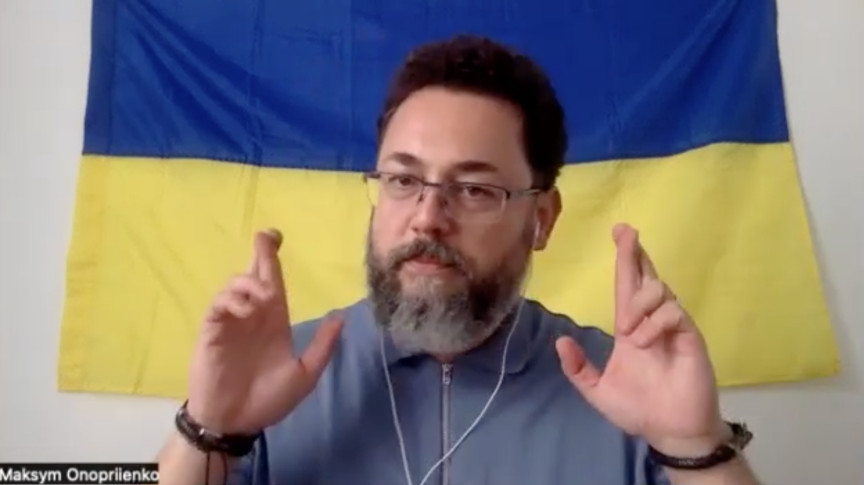
– You mentioned that the National Council is already thinking about what the industry will be like after the war. Does the regulatory authority have an understanding of what needs to be done first after our victory?
– First of all, I very much hope that after the victory there will be no opponents of the Media Law. Now we are reaping the fruits of imperfect legislation, when for many years we had no influence over such channels as 112, ZIK, Nash and others. There should be a powerful regulatory authority that can do more than just issue a warning or penalty. A thousand hryvnias is nothing for them. The information war always precedes the real one, and we can see it clearly in Ukraine. That's why it is important to strengthen the functions of the regulatory authority and to register and license broadcasters, in particular OTT platforms. A full-scale war had to happen in order for Ukraine to block access to Russian content. We've been saying this for years. Even in Armenia the regulatory authority can influence not only the TV channel as a whole, but it can suspend the release of a particular program. Can you imagine that? The Armenian regulatory authority may suspend the program broadcast in order to analyze the statements contained in it and conduct the investigation.
– How is this technically done?
– They write to the TV channel to stop the program from airing. If the channel refuses to do this, they will shut it down. Hence, the Media Law is the first thing. I believe its wording, given the military circumstances, will change, but I hope we won't hear again that the time hasn't come yet. The second thing concerns the industry in general. Within the National Council, we have already drawn up a picture on many points, from planned number of multiplexes (you've probably seen that Zeonbud has sent proposals to reduce and optimize costs) to licensing or registration. But first of all, we are going to listen to the industry, we are planning to communicate with media groups to have maximum support and take steps that will help the industry survive and recover. I believe a lot will change in the information component.

